Trail Magic
Skates, boots, and bikes: how outdoor adventures made space for the relationship my mother and I needed
1994
It’s a record cold winter in western Maryland. My mom, dad and I squeeze into the orange Ford pickup truck with the scratchy seat covers that smell like sweat and bar oil. We follow narrow roads to see if water is still running at a dam on the Potomac River. Jammed ice sheets look like monstrous, powerful teeth to my 10-year-old eyes. I snap photos with my little red film camera.
After we get home, Mom wants to take me to town to buy ice skates. Earlier, she walked down to the end of the road, crossed the railroad tracks, and beat through bushes. The old, pre-railroad boat canal had frozen solid. It doesn’t usually fill with water every year, much less freeze. But, at the moment, she sees that it’s smooth and glassy. She’s determined to get us both on skates. By the time that stagnant, fetid ditch is a magical ice rink again, I might be too old to care.
Now Dad is yelling, saying she’s stupid to drive 30 minutes to town just to spend money on ice skates that I may never use again. Mom and I get in the car anyway, both of us in tears. Later, in school, I learn about alcoholism and realize it explains a lot of things going on at home. But I don’t tell the counselor when she asks me about it.
When Mom and I step onto the ice, we enter a private world, and it’s one of my mother’s creation. The new white K-Mart skates smell like clean leather and squeak against my ankles. Mottled sycamore branches bow over our heads, forming a protective, muted tunnel. We glide and glide down the canal. The cold breeze in our faces dries our eyes.
It’s the first time I know the thrill of hard-won freedom in my chest.
2014
“Are the bears going to get me?” she asks in her pouty voice as we stuff our backpacks on the hot springs hotel floor. She’s been asking me this since she landed in Montana. I can’t tell if she’s doing a bit or if she’s really scared. Or maybe she’s doing a bit because she’s scared.
Back in West Virginia, she’s made the grizzlies “getting her” into a small-town meme by dramatizing her impending death to everyone at the bar. I’m tired of the contrived tension. But is it contrived? She’s my mother. I’m the one taking her out of her element onto the trail for a few days, and I don’t want to terrorize her.
I’m trying to get her backpack to weigh less. She doesn’t want to remove the stuffed animal tied to the outside because it will “help her sleep at night.” Later, I’ll feel bad for squashing her whimsy. More worrying, she’s carrying a round metal tin I recognize from my childhood bathroom cabinet. I didn’t even need to see the mint green vintage packaging because I smelled it wafting from her bag. Inside is a pus-yellow petroleum-based ointment called Porter’s Liniment Salve. Mom puts the old-time drawing ointment marketed for pet, livestock, and human first aid on her cracked heels.
It’s a comfort item to Mom, but, to me, it smells like a bear attractant. I don’t want to tell her this, and I don’t want to sound like Da d — he hated the clove- and camphor-based astringent smell. But she won’t give it up. I get impatient. She starts crying. Her feet have been deformed for years now, and I know she’s nervous about them holding up for several days. I gently explain that bears are very curious. If they smell a strange odor, it could bring them into camp. We can work to prevent blisters, and if she gets them, I have less stinky solutions.
The next day, we stop to get our backcountry permits. I pull the ranger aside and let him know that Mom could use some extra reassurance about bears. I ask him about grizzly activity in areas we’re traveling through and he tells me it’s minimal. While Mom goes to get something from the car, he shares his one significant grizzly encounter in 20 years of backcountry rangering.
While sleeping in a lightweight bivy sack that left his head exposed to the open sky, he woke up one night to hot air in his face. A wide head blocked his view of the sky as a bear sniffed through the mesh insect barrier around his head. He lay frozen, until the bear turned and wandered off.
He thinks the grizzly smelled the bug spray on his head from earlier in the day. You know, he tells me, they’re curious animals. I ask him not to tell her this.
We never see a bear along the Black Canyon of the Yellowstone. Mom hikes 12 miles in a single day on her deformed feet,; I only carry her pack up a hill once. We stop for lunch on a cliff looking over the ocher whitewater of early summer runoff. Mom says it reminds her of taking me to the small boulder in the woods near my childhood home. We called it our “thinking rock.”
With the anticipation of the trip behind her, Mom relaxes. She channels her energy into curiosity and excitement about the landscape around us. Over a lunch of salami and cheese, I realize she’s stopped doing her bit. Maybe hiking takes enough energy, I think. But then, I realize that she’s her most authentic self in nature. Few other people in her life probably know that about her, if any. I’m not always at my best around Mom. So I end up feeling bad because I know how much she cares both for me and for my approval. I resolve to take more trips so we can spend peaceful and meaningful time together, while she’s still able.
I turned 30 during her visit; she turned 60 that August. As we sat drying our feet above the Yellowstone, we talked about how her photography career wasn’t where she’d hoped it would be. Still, she was planning an art show at home looking back on 30 years of her work. She still needed to figure out how to make money off her art, to be less dependent on her longtime boyfriend.
Years later, I read in her journal that the hike inspired her to reprioritize herself, because I convinced her to rent an art studio outside her home while we walked. Between her partner, her day jobs, and caring for her aging mother, no one else would make that space for her art.
The next day, we’re standing in a meadow of blooming lupine. She’s photographing the flowers when one of the largest pronghorn bucks I’ve seen materializes. We stop as he grazes in our direction, completely unaware of our presence.
At less than 40 yards, he lifts his head to stare at us. We study his belted face until he calmly walks behind a hill. That was the first pronghorn Mom had ever seen, in a field of wildflowers in Yellowstone National Park, no less. It’s tempting to say something sublime passed between us and the creature. Or maybe the shared moment provided the canvas for Mom and I to project something unspoken about our own connection.
2018
Her 15-year-old bike is rusted beyond repair, and I declare the brakes unsafe. So we rent bikes to ride on the C&O Canal, the same one we skated on years before.
We take turns photographing each other in action. I’m wearing knee-high socks with shorts in December and a pair of her fingerless gloves with pink stripes that go to the elbow. This time I lean into Mom’s whimsy; I clown for her camera by standing on the bike saddle and balancing on one leg.
When we get back to the bike shop, I see the prices on used rentals and think about my mother riding the two-wheeled death trap in her shed. I ask her to try out several bikes, and we find a women’s hybrid cruiser that’s perfect for the canal and around town. It’s bright turquoise. She picks out a big woven basket to put on the front.
I haven’t seen her this happy in a while. Her feet have gotten worse, so biking is easier than hiking. I’m proud to give her something nice that she really needed, that we can bond over. She embarrasses me by telling everyone we see in town that my husband and I bought her a new bike for Christmas.
Mom rides everywhere. People around town always know where she is because the turquoise bike is parked out front of the post office or on the main street. She starts going 12, 15, and 20 miles on the canal. I convince her that she could ride the entire C&O Canal if she wanted, 184.5 miles from Washington, D.C. to Cumberland, Maryland. My childhood best friend and I did it when we were 17, and she still can’t believe she dropped us both off in the city to find our way home unharmed.
Now I have all the lightweight gear we need to do it and could carry most of it myself. We decide I’ll fly out to do it in May, before it gets hot, for Mother’s Day.
The first night we sleep at a renovated lock house not far from Washington, D.C.. The inside is outfitted with antiques and period-correct rope beds. The outside is whitewashed. It feels haunted. The next morning, I wake up to Mom sitting outside by a campfire she built, in her orange muumuu, with her hair in a scarf, writing in her journal. She looks like she’s in a colonial Better Homes and Gardens photo shoot, not on a bike camping trip.
Bluebells are blooming along the canal, and it’s just starting to get muggy. We pedal slowly but steadily all day, and I try to stay patient with the pace. We plan to get to her house near the canal that night, in time to go to dinner with her partner at their favorite restaurant. But when we arrive, he is acting surly for no reason.
We go to dinner without him, and I can see Mom worrying about why her boyfriend was unkind — all the while determined not to let it spoil our time together. When we get back to my mother’s house, her partner is visibly drunk. He starts yelling at her. I later learn that his friend, who is a woman, who he flirts with often, needs him to “fix her oven.” But he doesn’t tell us that. I tell her we don’t have to put up with this. Mom realizes we can’t stay at her house like we planned and have peace. I realize how little tolerance I have left for being in a house with an angry alcoholic.
She decides to book us a room at a local hotel that she probably can’t afford. By now it’s late, dark, and pouring rain. We still have to ride two miles before we can rest. Mom declares that she’s rising above it all, from under her poncho hood, while pushing her bike up a steep hill. She’s finished letting angry men ruin her life. The buoyancy of spirit that inspires her to attach toy totems — like the stuffed teddy bear on her bedroll — also wards off despair over her current relationship. She tells me that she’s sorry. I tell her that it’s not her fault. As Mom leans into positivity, I begin nurturing a seed of resentment toward her partner big enough for the both of us.
We stand dripping wet at the cavernous and outdated business hotel’s check-in desk. We learn they won’t be having Mother’s Day brunch the next morning. It’s yet another added insult to the long day. As we crawl into bed, I talk through our biking plans for the rest of the trip to distract her. Neither of us says what we’re both thinking — that today’s turmoil reminds us of living with my father.
The next morning, we eat tortillas with peanut butter and beef jerky on the hotel room floor. She seems happier with her improvised brunch when I tell her it’s a true bikepacker meal. We agree that, even if the day isn’t what we planned, it’s going to be memorable because we’re together. We set off from the hotel and back to our route, ride to the Potomac River bridge, then coast down a winding path back to the canal.
It’s a beautiful morning, and Mom shows me her favorite sandbar to write in her journal by the river, where she often sees white-tailed deer drinking. The towpath is fragrant with flowers and wet soil; the humidity passed with the rain. Mom is peddling strongly. We look ahead, faces in the wind.
Our last camp is far into western Maryland where, instead of colonial towns, camper trailers dot the opposite river bank in West Virginia. Fern-covered cliffs give way to state forests or narrow back roads leading to biker bars. Most cyclists we encounter are men my Mom’s age, completing the canal ride in spandex on fast and fancy bikes. I wonder if Mom — sitting upright on a drop-framed hybrid bike, wearing a skirt and Superwoman t-shirt — inspires any of them to question why they’re taking this old mule path so seriously.
These final moments on this ride, when we’ve found our rhythm of camping and cycling but we’re not yet anticipating the end, stay with me. There, Mom and I could be together without either pretense or tension. It’s one of my last memories of our outdoor time spent together, before she passed in 2021. When I miss her, I like to remember that day on the canal. It suspends her in an eternal summer.
It’s early morning. I climb a ridge above our camp to get some solitude and a view of the Potomac. This is my favorite part of the canal because it’s far from any population center. Overgrown dead-end lanes and foreboding conifer forests hint at the wildness that was here before the towpath and railroad punched through.
When I return, Mom is in the orange muumuu practicing tai chi on a flat grassy spot next to the towpath. I sit quietly watching her for a bit. She tells me that one of the serious guys stopped in our camp to talk. He was nice enough, but had a lot of questions about our gear. Then, without asking, he made himself at home in our camp and started cooking his breakfast.
Instead of saying anything, Mom went to the outside of her tent and continued working on a medallion she’d been building on the ground. She made a conspicuous production of arranging a circle of rocks, sticks, bird feathers, and bones — humming a tune and occasionally standing to appraise her work. He left pretty quickly, she said.
We laughed at the prospect of the spandex guy going back to the city and telling his friends he might have encountered an Appalachian witch on the C&O Canal. At that moment, I finally appreciated Mom’s exaggeration and theatrics. It also hinted at a larger truth.
Together, we could carve out space for ourselves in the world. It wasn’t witchcraft, but there is some magic in it.
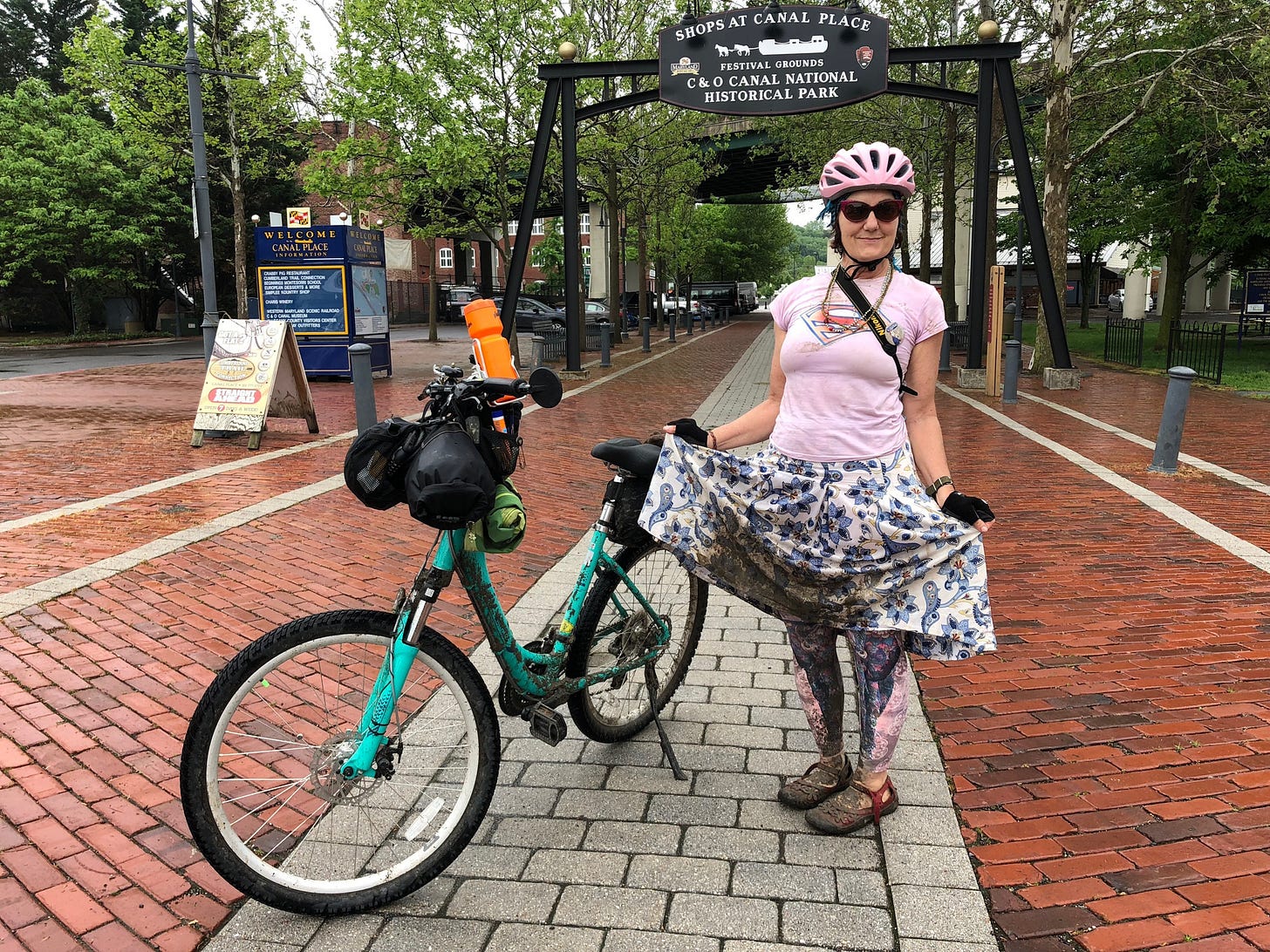
Kestrel Keller is Executive Editor of The Westrn. Their writing and reporting on science, conservation and rural culture has appeared in High Country News, Smithsonian, National Geographic, MeatEater, Outdoor Life, Outside, and many others. Kestrel is a reverse transplant from Bozeman, Montana to New York’s Hudson Valley.



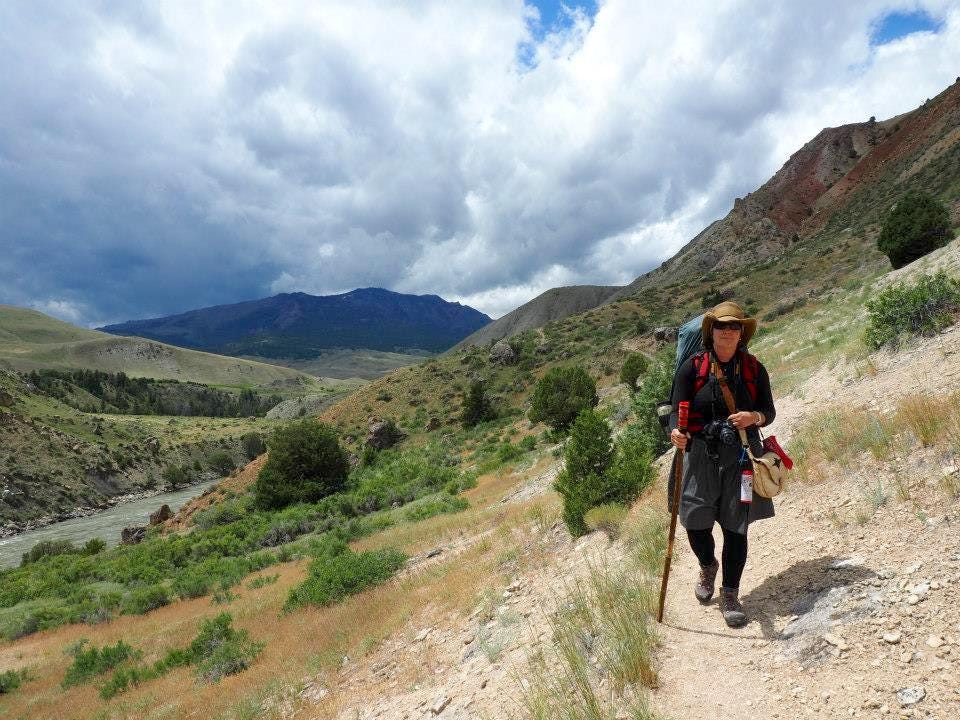
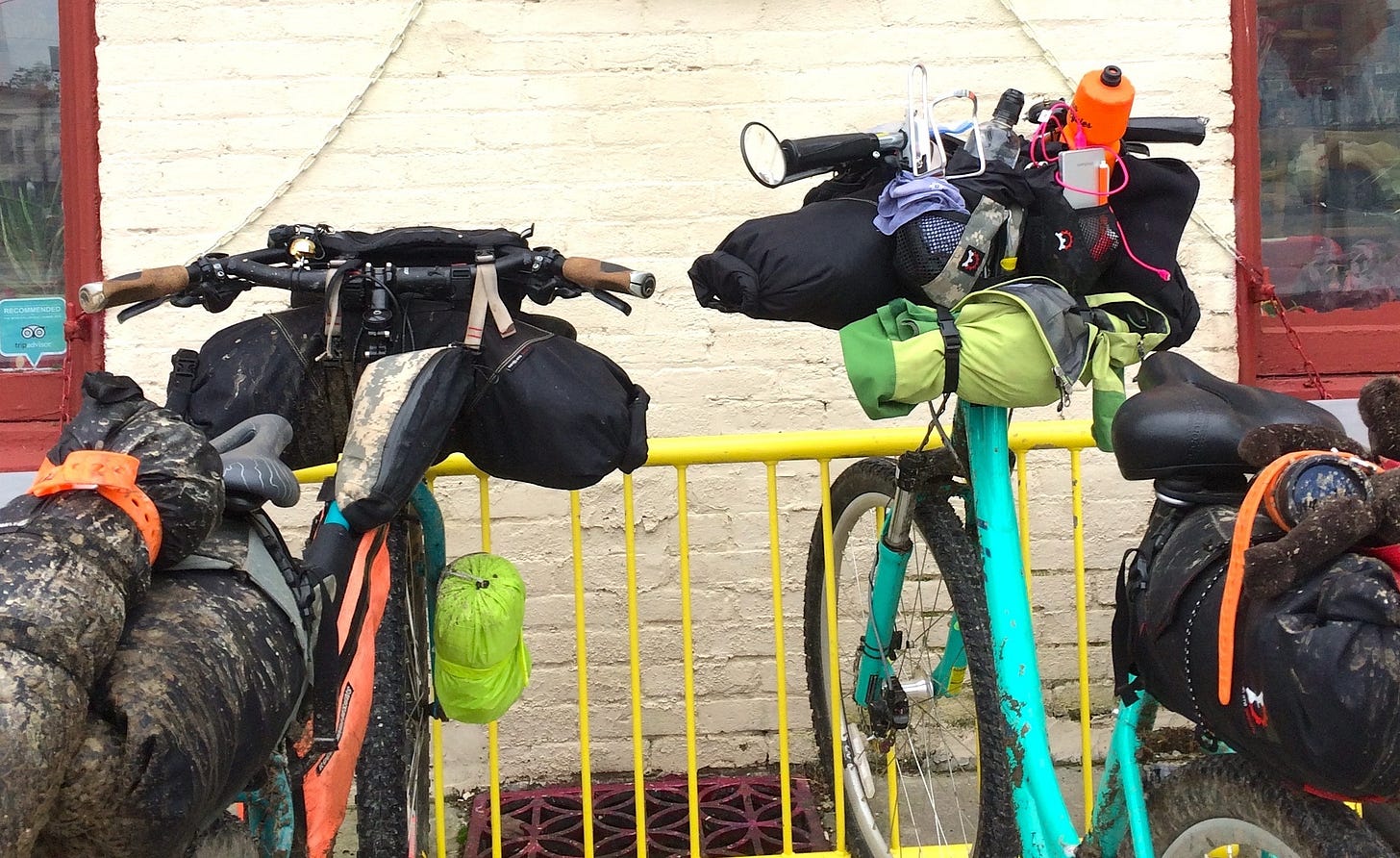
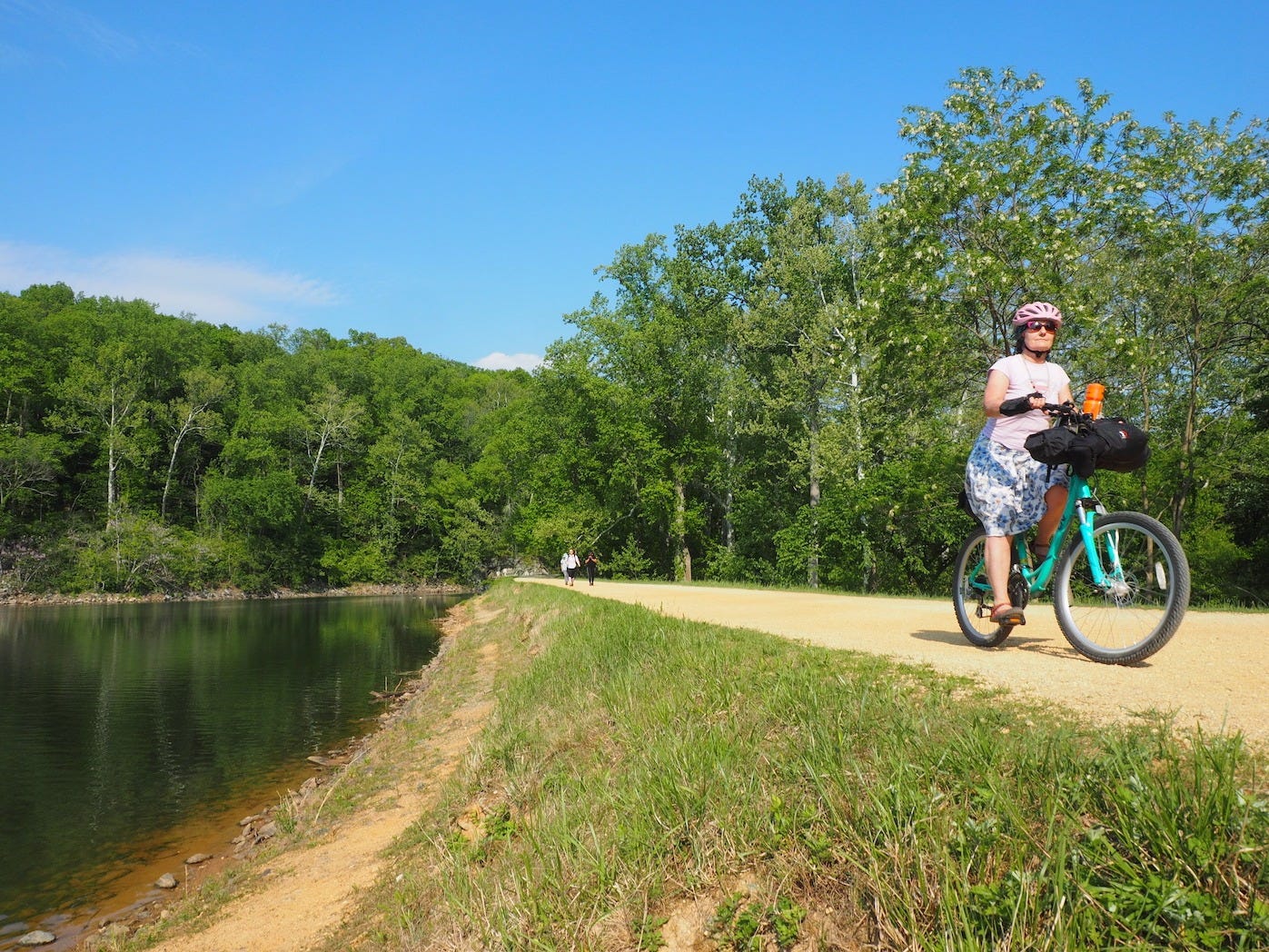
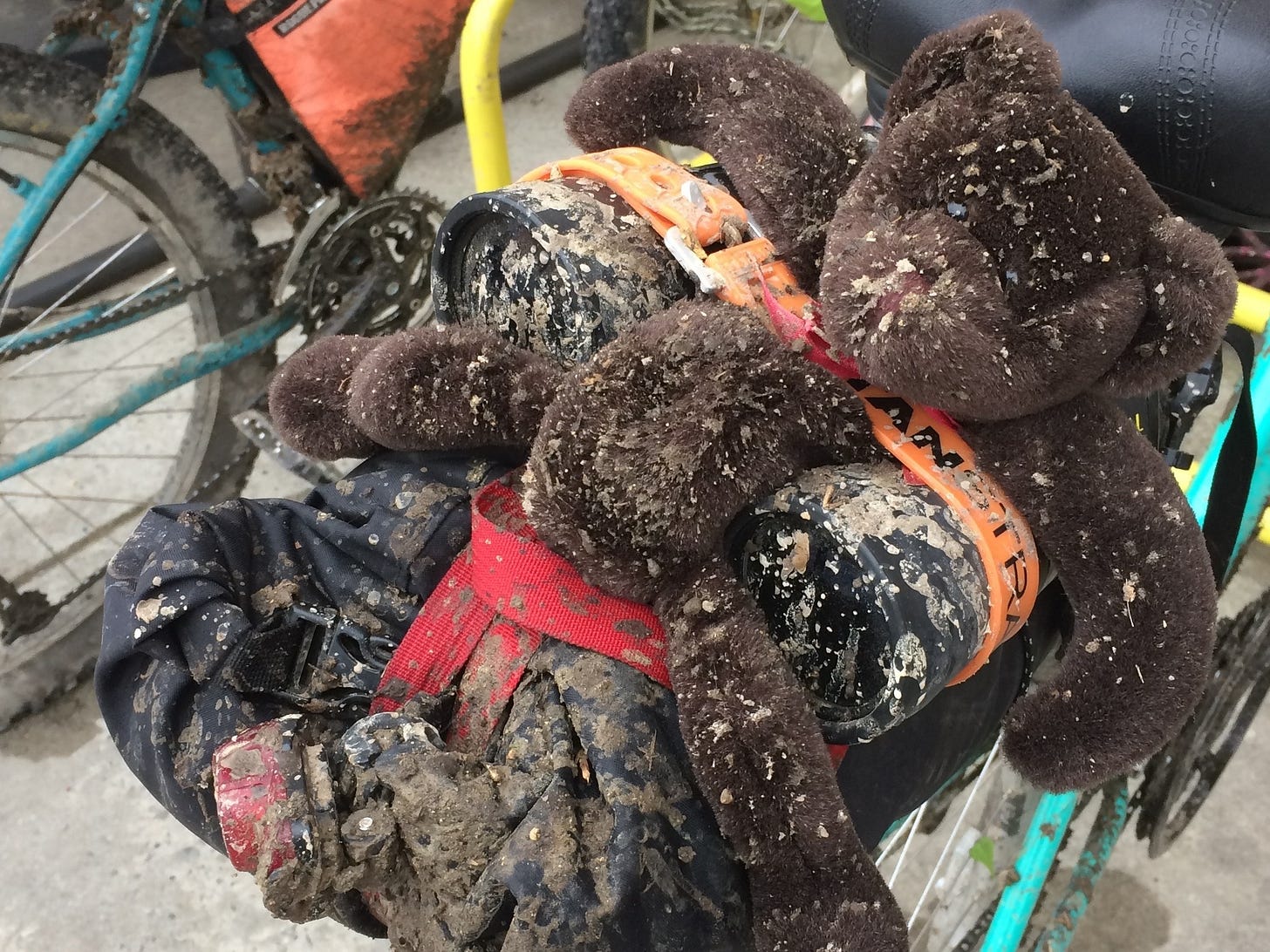
Wonderful story. Well done.
It’s not easy to write vulnerability so clearly. I loved this.